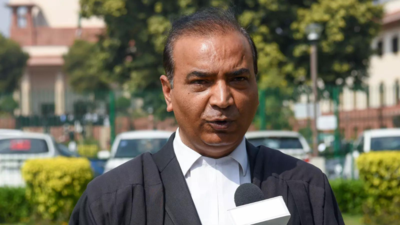NEW DELHI:
Advocate Ashwini Upadhyay
on Thursday said that the
religious character
of a place cannot be determined through mere observation and argued for the necessity of surveys at disputed sites.
Upadhyay also challenged the validity of the Places of Worship (Special Provisions) Act, 1991, calling it unconstitutional and claiming it legitimizes historical actions by rulers such as Babar, Humayun, and Tughlaq.
Advocate Ashwini Upadhyay said, “The opposite side said that the order to conduct a survey at 18 places should be withdrawn. We objected to it as the
Places of Worship Act
1991, talks about the religious character.”
He added, “The religious character cannot be defined just by looking at it. No one can tell whether it (a place) is a temple or a mosque just by looking at it. A survey must be conducted. No law can be made to legalise the illegal work of Babar, Humayun, Tughlaq, Ghazni and Ghori.This law is completely against the Constitution of India.”
The Supreme Court bench, comprising Chief Justice Sanjiv Khanna and Justices PV Sanjay Kumar and KV Viswanathan, on Thursday restrained all courts across the country from passing any interim or final orders, including surveys, in ongoing cases related to religious structures. Additionally, the bench prohibited the registration of fresh suits over such disputes while the matter remains under consideration.
The court was informed that 18 suits concerning 10 mosques or shrines are currently pending across the country. The Centre has been granted four weeks to submit its affidavit addressing the provisions of the Act, which petitioners claim is unconstitutional and denies the rights of Hindus, Jains, Buddhists, and Sikhs to restore their places of worship destroyed by historical invaders.
The 1991 Places of Worship Act prohibits the conversion of any place of worship and mandates that its religious character as of August 15, 1947, be preserved.
Several petitioners, including BJP leader Subramanian Swamy, members of the Kashi Royal Family, and other leaders, argue that the law unfairly denies communities the right to reclaim and restore their
historical places of worship
.
